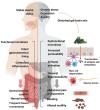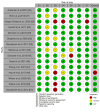The Efficacy of the Low-FODMAP (Fermentable Oligosaccharides, Disaccharides, Monosaccharides, and Polyols) Diet in Irritable Bowel Syndrome: A Systematic Review and Meta-Analysis
- PMID: 39917138
- PMCID: PMC11799870
- DOI: 10.7759/cureus.77053
The Efficacy of the Low-FODMAP (Fermentable Oligosaccharides, Disaccharides, Monosaccharides, and Polyols) Diet in Irritable Bowel Syndrome: A Systematic Review and Meta-Analysis
Abstract
Irritable bowel syndrome (IBS) is frequently observed in clinical practice and affects people from different parts of the world. The pathogenesis and aetiology are not well-defined or fully understood; however, altered bowel movements, psychological factors, and visceral hypersensitivity may contribute to symptoms via a pathway mediated by serotonin and other enteric neurotransmitters. Altered bowel movements, including diarrhoea and constipation, abdominal pain relieved by passing flatus, and bloating are the main salient features of this condition. This systematic review and meta-analysis aimed to determine the effectiveness and efficacy of a low-fermentable oligosaccharides, disaccharides, monosaccharides, and polyols (low-FODMAP) diet in these patients. Systematic searches were conducted on PubMed, Medline, Google Scholar, and Cochrane Library. Randomised controlled trials (RCTs), systematic trials and cohort studies that included keywords about IBS and a low-FODMAP diet were included. Exclusion criteria included studies that were not in the English language, not relevant to IBS, diet-related to inflammatory bowel disease, or not pertinent to the subject. A total of 41 studies were included in this systematic review and meta-analysis. There was significant heterogeneity among the RCTs; hence, a random-effects model was used. The systematic review included a total of 8460 patients across 36 studies, with follow-up durations ranging from 11 to 16 months. Specifically, the meta-analysis included 15 RCTs with 1118 participants and follow-up durations from two days to nine weeks and six cohort studies including 292 patients with follow-up durations from two weeks to two years. The risk ratio (RR) was 1.21 (95% confidence interval= 0.98-1.51), and the I2 value was 63% for global symptom improvement with a low-FODMAP diet using a random-effects model. There was a low risk of bias in the RCTs. Five studies were included evaluating the effect of a low-FODMAP diet on quality of life, and these studies did not show any statistically significant benefit of a low-FODMAP diet on quality of life, although a mean difference of 4.59 (95% CI 1.50-7.67) was observed. The risk of bias was moderate to severe in the observational studies included in this review. Food intolerance is increasingly recognised as a contributory factor in IBS, and its role in the pathogenesis and precipitation of symptoms is being explored. Specific mechanisms include the fermentation of FODMAPs by the gut microbiota, leading to gas production and subsequent symptoms.
Keywords: british dietetic association; general dietary advice; high-fodmap diet; ibs (irritable bowel syndrome); ibs-sss; irritable bowel syndrome with diarrhea; low-fodmap diet; medical subject headings; structural individual low fodmap dietary advice; treatment of irritable bowel syndrome.
Copyright © 2025, Khan et al.
Conflict of interest statement
Conflicts of interest: In compliance with the ICMJE uniform disclosure form, all authors declare the following: Payment/services info: All authors have declared that no financial support was received from any organization for the submitted work. Financial relationships: All authors have declared that they have no financial relationships at present or within the previous three years with any organizations that might have an interest in the submitted work. Other relationships: All authors have declared that there are no other relationships or activities that could appear to have influenced the submitted work.
Figures












References
Publication types
LinkOut - more resources
Full Text Sources
